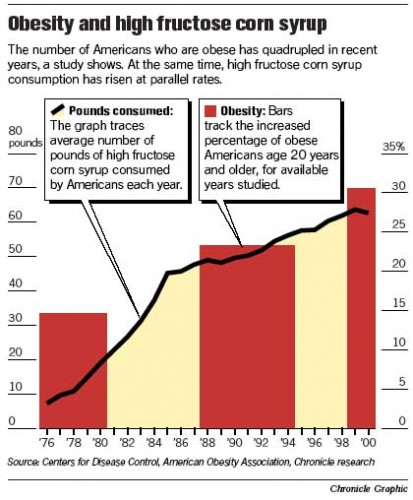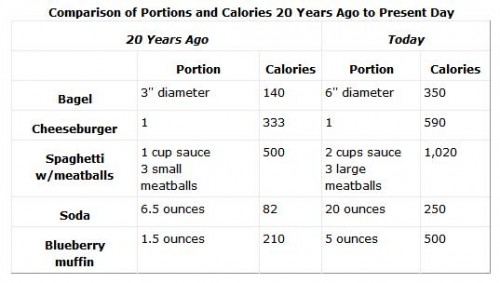A new study from Yale University published in the Journal of the American Medical Association and reported at Bloomberg details something that has been gaining more and more scientific support: fructose has a significant link to weight gain and obesity.
I have been compiling links for several months now about all of this stuff, including a report from last year
put out by the UK Guardian that made a bold claim – that we are on average more than 40 pounds heavier than we were three decades ago, and much of it isn’t about eating more or exercising less … but about the growing amount of sugar in everything we eat. This makes a compelling read by itself, particular the history of how we ended up with high fructose corn syrup in everything
But there IS also an impact of eating more or exercising less … take a look at the portion increase info here , here and here, and shown in dramatic fashion in how we describe ‘a portion’ now compared to just 20 years ago:
Also, while the impact of our more sedentary lifestyle might be disputed based on the ‘hunter gatherer argument’, but a study looking at the weight of kids in Fukushima a year after the tsunami and nuclear meltdowns shows that because of being kept indoors nearly all the time the obesity rate has nearly doubled. So it remains a consideration.
But back to the impact of fructose. There was an article asking ‘Why Is It So Hard To Lose Weight’ that addressed the high sugar content in so much of the ‘supermarket diet’ that has shown immediate weight gain and overeating in lab rat studies. Then in September there was a set of reports noted at the Huffington Post.
The new study is intriguing because it points to the brain triggers more clearly than before. The bottom line goes back to something I talked about before – that if something is SUPPOSED to have fat yet is ‘non-fat’, chances are it has been replaced by sugar. And chances are that sugar is largely in the form of high fructose corn syrup – which goes back to the Guardian article at the top and informs the confused scientists of the 80s who looked at the fitness and low-fat crazes of the late-70s and early-80s and wondered why people were gaining rather than losing weight.
And so as we launch into 2013, that ‘Sweet Surprise’ advertising that sought to ‘clear up the myths’ about ‘corn sugar’ but was quickly smacked down in 2011, seems more than just misleading … it is downright deadly based on the obesity epidemic in our country.

